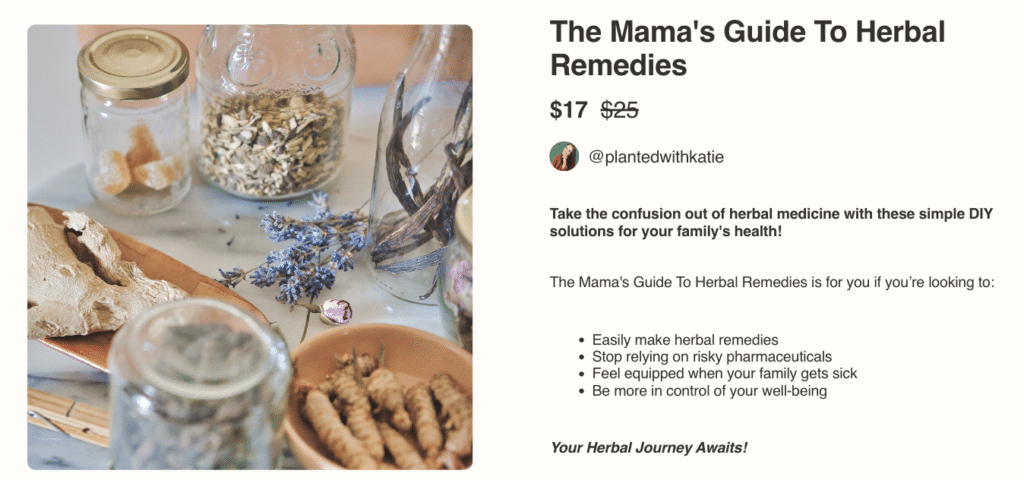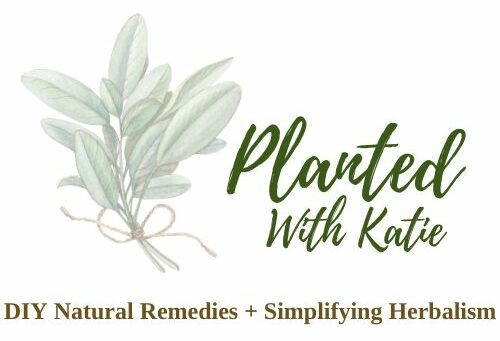10 Home Remedies To Naturally Get Rid Of Cold Sores (Herbal Remedy For Cold Sore)
We know those pesky cold sores can be a real pain in the lip. But fret not, because we're about to dive into the world of home remedies to find your top herbal remedy for cold sore treatment.

This post may include affiliate links. Please refer to our disclaimer for full disclaimer.
This is not to be taken as medical advice.
Say hello to our herbal heroes – lemon balm, Kanuka honey, tea tree oil, peppermint oil, aloe vera gel, St. John's Wort, zinc oxide, echinacea tea, and the vitamin C superhero – all ready to join forces and kick those cold sores to the curb!
Yep, that's right – plants might just have the magic touch to help you on your cold sore-busting journey. No eye of newt or frog legs involved, we promise! These herbal remedies have some serious potential in soothing your sore soul and supporting your skin's healing process.

First up, let's meet the soothing superstar – lemon balm (Melissa officinalis). With its antiviral powers, lemon balm is like a ninja against the herpes simplex virus. It can help inhibit viral replication and reduce inflammation, giving those cold sores a run for their money. You can apply lemon balm cream or sip on some lemon balm tea – it's like a spa day for your lips!
Next in line is our sweet honey hero – Kanuka honey! This golden goodness isn't just for pancakes; it's a powerhouse of antiviral and antibacterial magic. Kanuka honey brings its MGO weapon to the party, ready to take down the herpes simplex virus and prevent those annoying bacterial infections from messing with your healing process. Dab a little pure Kanuka honey on your cold sore, and let it work its wonders while you daydream about becoming a beekeeper (or not).
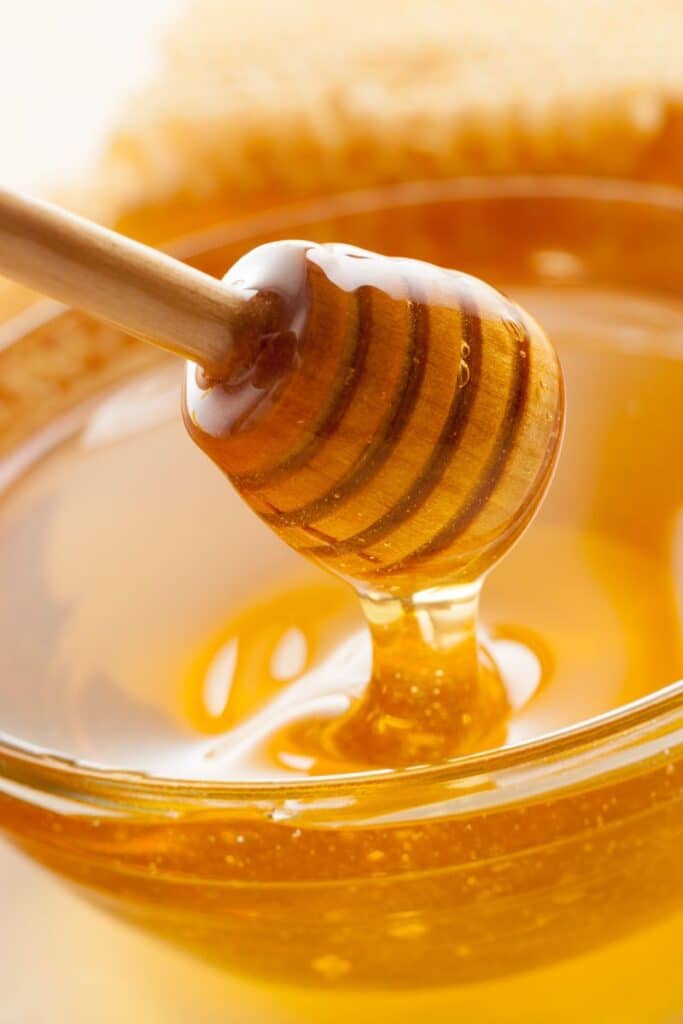
But hold on, we've got more contenders in the ring! Our essential oil amigos – tea tree oil and peppermint oil – are here to save the day. Tea tree oil is like a ninja warrior, ready to shrink those cold sores with its antiviral and antimicrobial powers. Dilute it with a carrier oil, and you've got yourself a natural remedy that means business. As for peppermint oil, it's like a cool breeze on your lips, providing relief from the pain and itching while fighting off that pesky virus. Who knew plants could be so fierce?
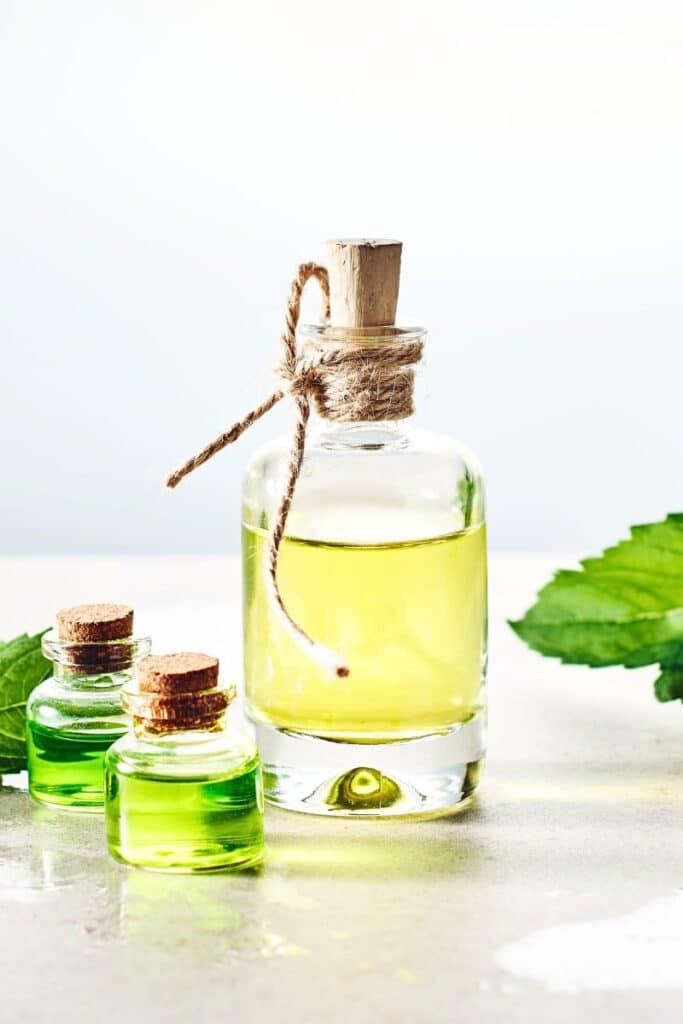
Don't worry; it's not just about the oils! Aloe vera gel is here to calm the chaos. This cool and soothing gel forms a protective barrier over your cold sore, preventing further irritation and giving you that "I got this" feeling. Slather some of that magical aloe vera gel on your cold sore, and let it work its healing charm. It's like a superhero cape for your lips!
Up next, we have the mysterious St. John's Wort. This herb has been used for ages to treat various ailments, including cold sores. With its antiviral compounds and skin-loving properties, St. John's Wort is like a secret agent working quietly and effectively – no flashy moves needed.
And let's not forget about the knight in shining armor – zinc oxide! This powerful mineral has antiviral properties and is a master at protecting your cold sore from harmful irritants and pesky bacteria. A little layer of zinc oxide-based cream, and your cold sore will feel like it's wrapped in a cozy, protective blanket. You've got this, cold sore warrior!
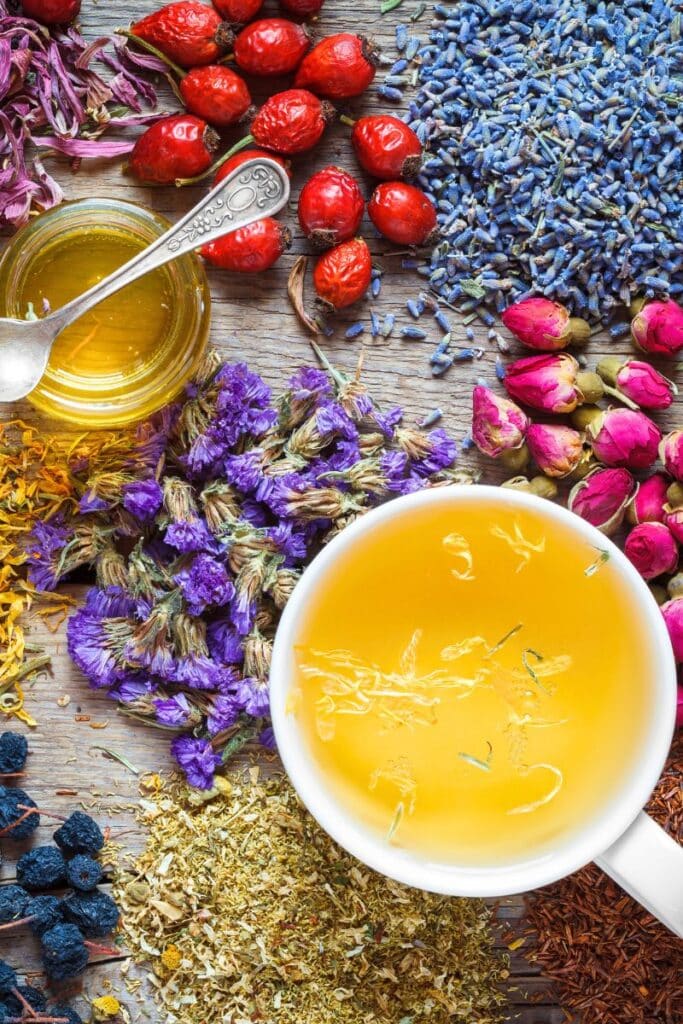
But we're not done yet! Echinacea tea is joining the party with its immune-boosting prowess. Sip on this herbal delight, and your immune system will be like a squad of defenders, ready to fight off those cold sore invaders. Fewer outbreaks mean more time for you to strut your stuff with confidence!
And last but not least, here comes the caped crusader – vitamin C! This antioxidant superhero is all about boosting your immune system, so those cold sores don't stand a chance! Citrus fruits, strawberries, bell peppers – they all pack a vitamin C punch to help you in your battle against those pesky cold sores.

So there you have it, a team of herbal heroes ready to kick cold sore butt and make your life a little easier. Remember, each person's journey is unique, so find what works best for you and embrace the power of nature in your cold sore-fighting arsenal. Happy healing, and may your lips be forever free from those unwelcome visitors!
1. Lemon Balm (Melissa officinalis)
Lemon balm, also known as Melissa officinalis, is a fragrant herb with a long history of medicinal use. It possesses antiviral properties and is well-regarded for its ability to manage cold sore outbreaks and support the healing process.

Antiviral Properties
Lemon balm contains compounds like rosmarinic acid, flavonoids, and polyphenols, which exhibit potent antiviral activity. When applied topically or used as a herbal tea, lemon balm can help inhibit the replication of the herpes simplex virus, the primary cause of cold sores.
Soothing and Calming Effects
Lemon balm has natural soothing and calming effects, making it beneficial for relieving the discomfort and pain associated with cold sores. Applying lemon balm directly to the affected area or drinking it as a tea can provide immediate relief from cold sore symptoms.
Supporting the Healing Process
Lemon balm supports the skin's healing process, making it an excellent addition to your cold sore treatment plan. By promoting cell regeneration and reducing inflammation, lemon balm can contribute to faster healing and minimize scarring.
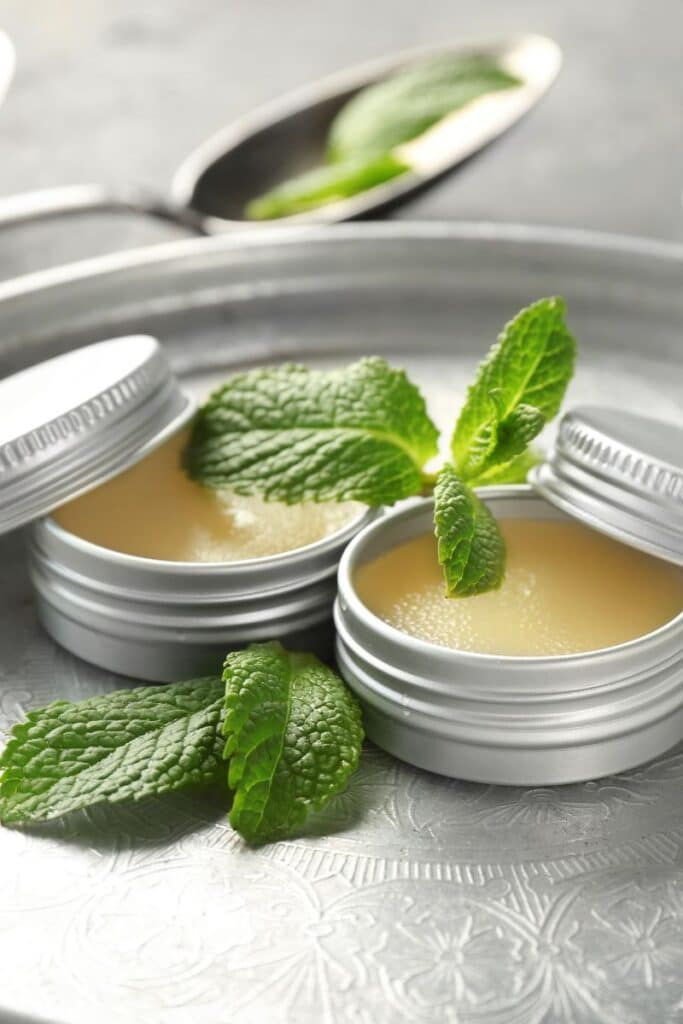
Using Lemon Balm for Cold Sore Relief
To use lemon balm as a natural remedy for cold sores, follow these steps:
- For topical use, apply lemon balm cream or ointment directly to the cold sore using a clean cotton swab or your finger. Repeat several times a day, especially during the early stages of the outbreak. You can also consume it as a tincture, found here.
- To enjoy lemon balm's benefits as an herbal tea, steep dried lemon balm leaves in hot water for about 5-10 minutes. Drink the tea while warm, preferably unsweetened, to support your immune system and alleviate cold sore symptoms.
Cautionary Note About Lemon Balm
Lemon balm is generally safe for most individuals when used topically or consumed as a tea. However, if you are pregnant, nursing, or taking any medications, consult with a healthcare provider before using lemon balm for cold sore relief.
Conclusion
Lemon balm is a versatile and effective herbal remedy for cold sore, thanks to its antiviral and soothing properties. By inhibiting the herpes simplex virus's replication, providing relief from discomfort, and supporting the skin's healing process, lemon balm can be a valuable addition to your cold sore management plan.
Whether you choose to use it topically as a cream or enjoy it as a herbal tea, lemon balm offers a natural approach to managing cold sore outbreaks. As with any herbal remedy, consistency is key to experiencing its potential benefits. If you have any health concerns or questions about using lemon balm for cold sore relief, consult with a healthcare provider for personalized advice. With proper care and the use of lemon balm, you can effectively manage cold sore outbreaks and promote faster healing.
2. Vitamin C
Vitamin C, also known as ascorbic acid, is a powerful antioxidant that plays a crucial role in supporting the immune system and overall health. Incorporating vitamin C into your diet or as a supplement can be beneficial in managing cold sore outbreaks and reducing their frequency.

Boosting the Immune System
Vitamin C is well-known for its immune-boosting properties. It supports the production of white blood cells, which play a vital role in fighting off viral infections, including the herpes simplex virus responsible for cold sores. By maintaining a healthy immune system, your body is better equipped to prevent and manage cold sore outbreaks.
Reducing Cold Sore Duration
During an active cold sore outbreak, vitamin C can help reduce the duration and severity of symptoms. Its antioxidant properties can minimize inflammation and aid in the healing process, potentially shortening the lifespan of the cold sore.
Preventing Recurrent Cold Sores
Incorporating vitamin C into your daily diet can help prevent recurrent cold sore outbreaks. A strong immune system is essential in keeping the herpes simplex virus in check and reducing the likelihood of frequent flare-ups.
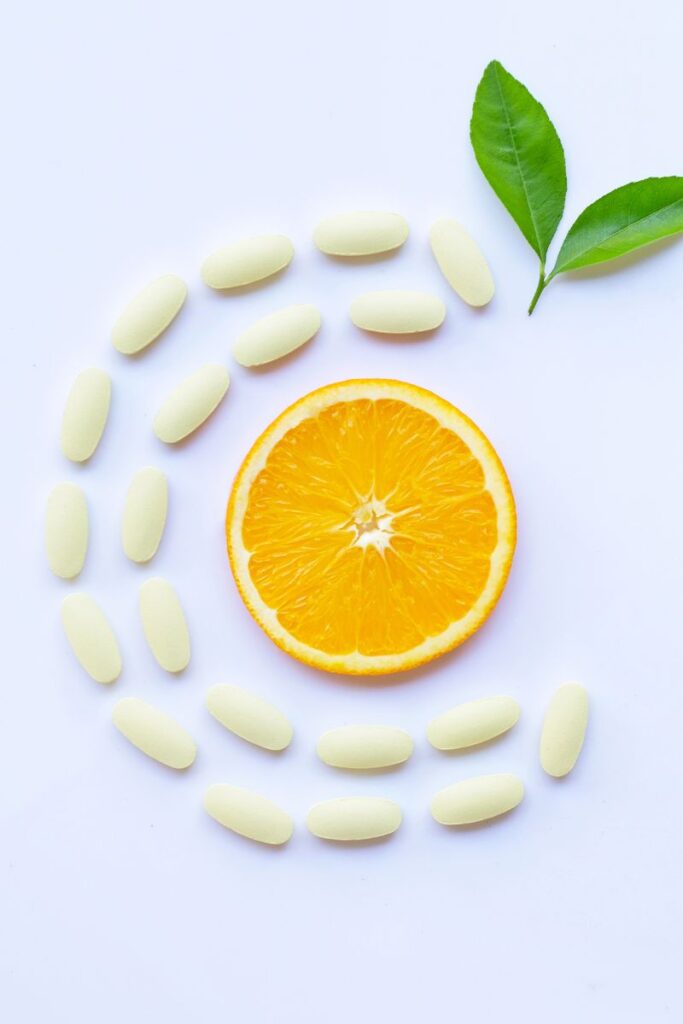
Using Vitamin C for Cold Sore Relief
To use vitamin C as a natural remedy for cold sores, follow these steps:
- Incorporate vitamin C-rich foods into your diet, such as citrus fruits (oranges, lemons, grapefruits), strawberries, kiwi, bell peppers, broccoli, and spinach. Rose hips are also high in vitamin C, so consider trying rose hip tea.
- Consider taking a vitamin C supplement if you have difficulty meeting your daily recommended intake through diet alone. Consult with a healthcare provider to determine the appropriate dosage for your individual needs.
Cautionary Note
Vitamin C is generally safe and well-tolerated, but taking excessive amounts may lead to digestive discomfort, such as diarrhea. Stick to the recommended daily allowance or the dosage suggested by your healthcare provider to avoid potential side effects.
Conclusion
Vitamin C is a vital nutrient that supports the immune system and can be beneficial in managing cold sore outbreaks. By boosting the immune response and promoting faster healing, vitamin C can help reduce the severity and duration of cold sores.
Incorporate vitamin C-rich foods into your diet and consider taking supplements if necessary to support your body's defense against the herpes simplex virus. As with any dietary supplement, it's essential to follow the recommended dosage and consult with a healthcare provider if you have any health concerns or questions about using vitamin C for cold sore relief. With proper care and a well-balanced diet, you can harness the immune-boosting benefits of vitamin C and effectively manage cold sore outbreaks.
3. Tea Tree Oil (Melaleuca alternifolia)
Tea tree oil, derived from the leaves of the Melaleuca alternifolia tree, is a potent essential oil known for its antiviral and antimicrobial properties. Its natural compounds make it an effective herbal remedy for managing cold sores and supporting the healing process.
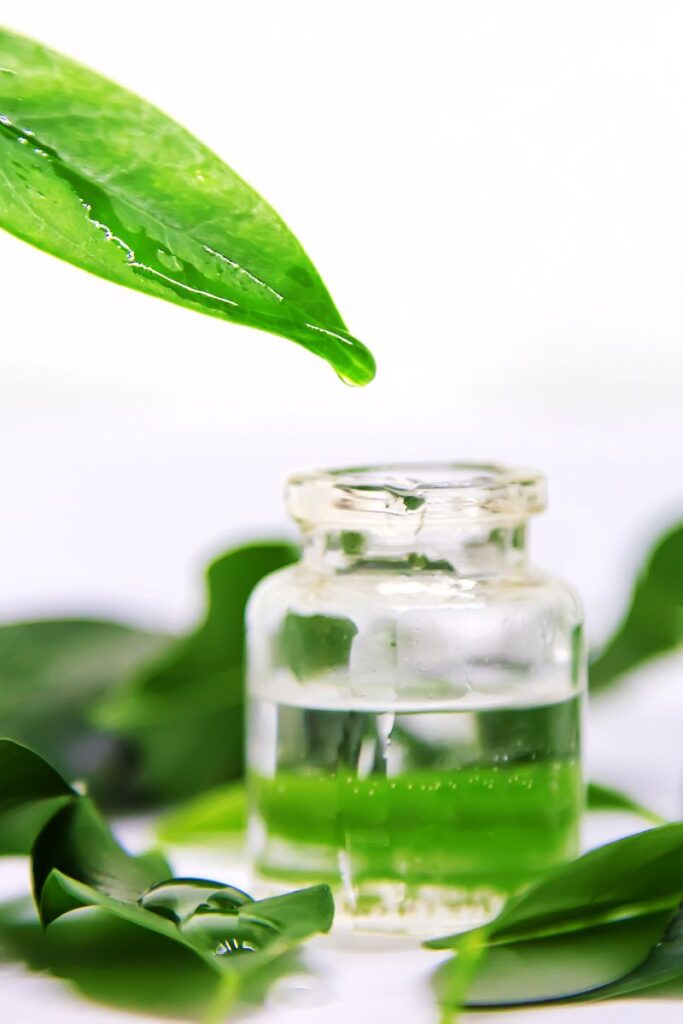
Antiviral and Antimicrobial Properties
Tea tree oil contains terpenes, such as terpinen-4-ol, that exhibit strong antiviral and antimicrobial activity. When applied to a cold sore, tea tree oil can help inhibit the replication of the herpes simplex virus and prevent bacterial infections, reducing the risk of complications.
Soothing and Drying Effects
Tea tree oil has a cooling and soothing effect when applied to the skin, providing relief from the discomfort and pain caused by cold sores. Additionally, its drying properties can help create a less favorable environment for the virus, potentially expediting the healing process.
Reducing Cold Sore Size and Duration
Regular application of tea tree oil to a cold sore can help reduce the size and duration of the outbreak. By targeting the virus directly and promoting a faster healing environment, tea tree oil may contribute to a quicker recovery.
Using Tea Tree Oil for Cold Sore Relief
To use tea tree oil as a natural remedy for cold sores, follow these steps:
- Dilute the tea tree oil with a carrier oil, such as coconut or almond oil, to avoid skin irritation. A safe dilution ratio is approximately 1-2 drops of tea tree oil per tablespoon of carrier oil.
- Wash your hands thoroughly to prevent the introduction of bacteria to the cold sore.
- Apply the diluted tea tree oil directly to the cold sore using a clean cotton swab or your finger.
- Allow the oil to absorb into the cold sore. You can leave it on or rinse it off after a few minutes if preferred.
- Repeat this process several times a day, especially during the early stages of the cold sore outbreak.
Cautionary Note
Tea tree oil is a potent essential oil and can cause skin irritation, especially when used undiluted. Always dilute tea tree oil with a carrier oil before applying it to the skin.
Additionally, some individuals may be sensitive or allergic to tea tree oil. Perform a patch test on a small area of skin before using it on a cold sore to check for any adverse reactions.
Conclusion
Tea tree oil is a powerful herbal remedy for cold sores due to its antiviral and antimicrobial properties. By inhibiting the herpes simplex virus's replication and promoting a faster healing environment, tea tree oil can be a valuable addition to your herbal remedy for cold sore treatment plan.
When using tea tree oil, ensure proper dilution and consistency to experience its potential benefits. As with any essential oil, consult with a healthcare provider if you have any health concerns or questions about using tea tree oil for cold sore relief. With proper care and the application of diluted tea tree oil, you can effectively manage cold sore outbreaks and support the healing process.
4. Aloe Vera Gel
Aloe vera gel, derived from the succulent leaves of the Aloe vera plant, has been used for centuries as a natural remedy for various skin conditions. Its soothing and healing properties make it a popular choice for managing cold sores and promoting faster recovery.
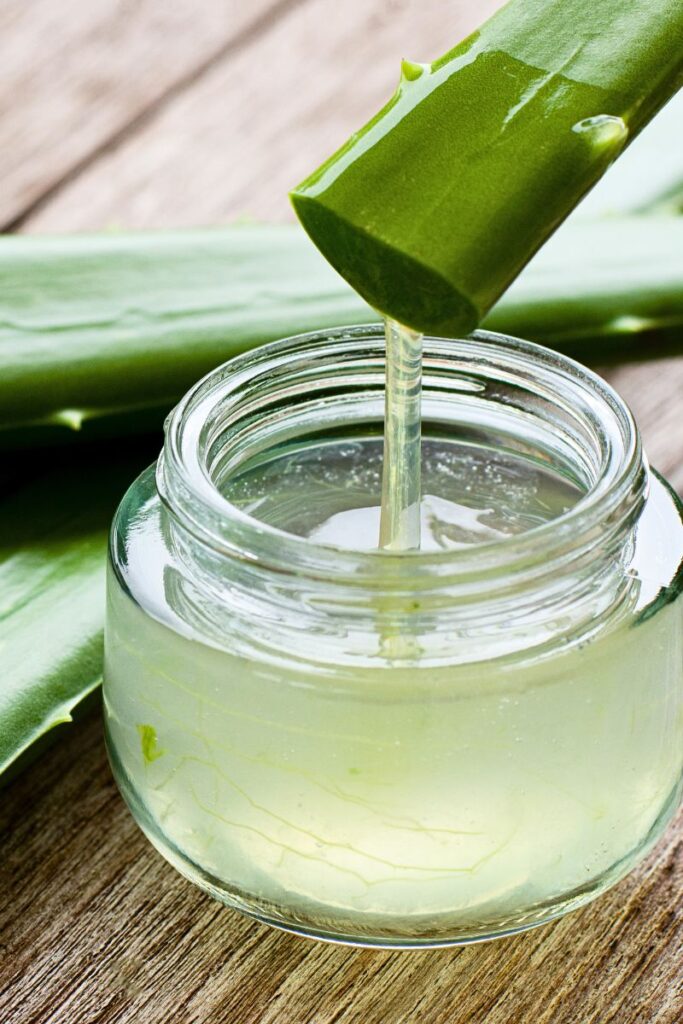
Soothing and Cooling Effects
Aloe vera gel contains compounds like acemannan, which have anti-inflammatory properties. When applied to a cold sore, it can help soothe the irritated skin and reduce redness and swelling. The cooling sensation of aloe vera gel provides instant relief from the discomfort associated with cold sores.
Healing Properties
Aloe vera gel is known for its ability to support the skin's natural healing process. When applied to a cold sore, it forms a protective barrier over the affected area, preventing further irritation and reducing the risk of secondary infections.
Reducing Pain and Itching
Cold sores can be painful and itchy, especially during the blistering stage. Aloe vera gel can help alleviate these symptoms, providing a natural analgesic effect and reducing the urge to scratch the sore, which can lead to further complications.
Using Aloe Vera Gel for Cold Sore Relief
To use aloe vera gel as a natural remedy for cold sores, follow these steps:
- Wash your hands thoroughly to avoid introducing bacteria to the cold sore.
- Extract a small amount of pure aloe vera gel from a fresh leaf or use a commercially available pure aloe vera gel. *I like whole leaf, organic filtered aloe vera gel linked here.
- Apply the gel directly to the cold sore using a clean cotton swab or your finger.
- Let the gel sit on the cold sore for as long as possible or leave it on overnight if comfortable.
- Reapply the gel several times a day to keep the affected area moisturized and protected.
Cautionary Note
While aloe vera gel is generally safe for topical use, some individuals may be sensitive or allergic to it. Before using aloe vera gel on a cold sore, perform a patch test on a small area of skin to check for any adverse reactions. If you experience any irritation or allergic symptoms, discontinue use and consult with a healthcare provider.
Conclusion
Aloe vera gel is a versatile and effective natural remedy for cold sores, thanks to its soothing and healing properties. By reducing inflammation, promoting the skin's healing process, and providing relief from pain and itching, aloe vera gel can be a valuable addition to your cold sore treatment plan.
When using aloe vera gel, make sure to choose a pure and high-quality product to experience its maximum benefits. Remember to apply it consistently throughout the duration of the cold sore outbreak and practice good hygiene to avoid further irritation and infection.
If you have any health concerns or questions about using aloe vera gel for cold sore relief, consult with a healthcare provider for personalized advice. With proper care and the application of aloe vera gel, you can effectively manage cold sore outbreaks and facilitate faster healing.
5. Kanuka Honey
Kanuka honey, derived from the flowers of the Kanuka tree (Kunzea ericoides), is a natural product known for its medicinal properties, including potent antiviral and antibacterial effects. Incorporating Kanuka honey into your cold sore treatment plan can help soothe the affected area and support the healing process.
How Is Kanuka Honey Different From Manuka Honey?
Kanuka honey has even been hailed as the “new super honey” due to its healing qualities. It shows particularly promising results as a topical treatment for skin disorders. Some scientists claim that some Kanuka honey has even higher levels of MGO (MGO may be responsible for reducing bacterial growth) than Manuka honey.
Mountain Valley Honey
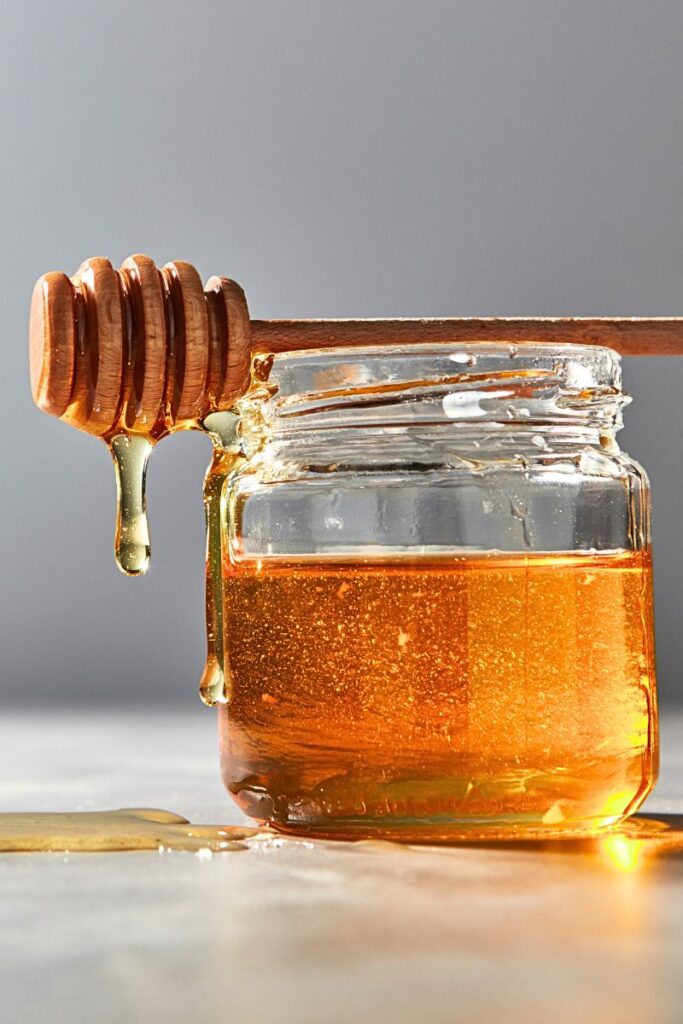
Antiviral and Antibacterial Properties
Kanuka honey contains unique bioactive compounds, such as methylglyoxal (MGO), that contribute to its antiviral and antibacterial properties. These properties make it an effective remedy for managing cold sores, as it can help prevent bacterial infections that may complicate the healing of cold sore blisters.
Soothing Effects on Cold Sores
Applying Kanuka honey directly to the cold sore can provide soothing relief from the discomfort and pain associated with the outbreak. Its smooth texture can create a protective barrier over the sore, promoting a healing environment and reducing the risk of further irritation.
Potential Expedited Healing
The high sugar content of Kanuka honey creates an osmotic effect, drawing moisture away from the cold sore and promoting a drier environment. This can be beneficial for the healing process, as viruses, like the herpes simplex virus, thrive in moist conditions. By creating a drier environment, Kanuka honey may help expedite the healing of cold sores.
Using Kanuka Honey for Cold Sore Relief
To use Kanuka honey as a natural remedy for cold sores, follow these steps:
- Wash your hands thoroughly to avoid introducing bacteria to the cold sore.
- Apply a small amount of Kanuka honey directly to the cold sore using a clean cotton swab or your finger.
- Leave the honey on the cold sore for at least 30 minutes or longer, if possible.
- Rinse off the honey gently with warm water after the desired time or leave it on as a protective barrier.
- Repeat this process several times a day during the duration of the cold sore outbreak.
Cautionary Note
While Kanuka honey can be a beneficial natural remedy for cold sores, it is important to use pure and authentic honey. Some commercial honey products may not have the same medicinal properties as high-quality, raw, and unprocessed Kanuka honey. Look for honey that has a high MGO content, as it indicates the honey's potential therapeutic value.
Conclusion
Kanuka honey offers a natural and effective way to soothe cold sore symptoms and promote faster healing. Its potent antiviral and antibacterial properties make it an excellent addition to your cold sore treatment plan.
As with any natural remedy, consistency is key, so make sure to use Kanuka honey regularly and as directed. Remember to practice good hygiene and avoid touching the cold sore to prevent further irritation and the spread of the virus.
If you have any health concerns or questions about using Kanuka honey for cold sore relief, consult with a healthcare provider for personalized advice. With proper care and the use of high-quality Kanuka honey, you can harness its healing benefits to manage cold sore outbreaks effectively.
6. Echinacea Tea
Echinacea is a popular herbal remedy known for its immune-boosting properties. Echinacea tea can be a valuable addition to your cold sore management plan, as it supports the body's natural defenses and may help reduce the frequency of cold sore outbreaks.

Echinacea's Immune-Boosting Benefits
Echinacea is rich in compounds called alkamides and caffeic acid derivatives, which have been shown to stimulate the immune system. Regular consumption of echinacea tea can help strengthen the body's defenses against viral infections, including the herpes simplex virus responsible for cold sores.
Preventing Recurrent Cold Sores
By bolstering the immune system, echinacea tea may help reduce the frequency of cold sore outbreaks. While it may not eliminate the herpes simplex virus from the body, a strong immune system is better equipped to keep the virus in check, preventing it from causing frequent cold sore flare-ups.
Managing Cold Sore Symptoms
Echinacea tea's immune-boosting properties can also support the body's ability to combat the herpes virus during an active outbreak. By enhancing the immune response, the body may be better equipped to reduce the duration and severity of cold sore symptoms.
Using Echinacea Tea for Cold Sore Relief
To use echinacea tea as a natural remedy for cold sores, follow these steps:
- Brew a cup of echinacea tea using a tea bag or loose tea leaves according to the package instructions.
- Allow the tea to cool down to a comfortable temperature.
- Drink the echinacea tea regularly, preferably daily, to support your immune system and potentially reduce the likelihood of cold sore outbreaks.
Cautionary Note
While echinacea tea is generally safe for short-term use in most individuals, those with certain autoimmune conditions or allergies to plants in the Asteraceae family (such as ragweed) should exercise caution.
If you have any health concerns or are taking medications, it's best to consult with a healthcare provider before incorporating echinacea tea into your routine.
Conclusion
Echinacea tea offers a natural and soothing way to boost your immune system and support your body's defenses against the herpes simplex virus. By reducing the frequency of cold sore outbreaks and potentially shortening their duration, echinacea tea can be an excellent addition to your cold sore management plan.
Remember that individual responses to herbal remedies can vary, and echinacea tea may take time to show its full effect. Consistency in consumption is crucial to experiencing the potential benefits of using echinacea tea for cold sore relief.
If you have any health concerns or questions, don't hesitate to seek guidance from a healthcare provider for personalized advice. With proper care and a well-rounded approach, echinacea tea can be a beneficial tool in your natural cold sore remedy toolkit.
7. St. John's Wort (Hypericum perforatum)
St. John's Wort is a flowering plant known for its medicinal properties and has been used for centuries in traditional medicine. One of its primary uses is for stress reduction, making it an ideal herbal remedy for cold sores, as stress is a common trigger for outbreaks.

How St. John's Wort Works Against Cold Sores
St. John's Wort contains several active compounds, including hypericin and hyperforin, which are believed to contribute to its therapeutic effects. These compounds have been found to influence neurotransmitters in the brain, leading to a reduction in stress and anxiety levels.
By promoting relaxation and easing nervous tension, St. John's Wort can help minimize the onset of cold sores triggered by emotional or psychological stress.
St. John's Wort and the Immune System
Additionally, St. John's Wort may indirectly support the immune system. When the body is stressed, the immune system can become weakened, making it more difficult for the body to fight off infections like the herpes simplex virus responsible for cold sores.
By helping to manage stress, St. John's Wort can indirectly support a healthier immune system and potentially reduce the frequency and severity of cold sore outbreaks.
Using St. John's Wort for Cold Sore Relief
St. John's Wort is available in various forms, including capsules, tinctures, and teas. It's essential to follow the recommended dosage guidelines provided on the product label or consult with a healthcare provider for the appropriate dosage based on your specific health needs.
To use St. John's Wort for managing cold sores, consider incorporating it into your daily routine during periods of stress or when you feel a cold sore appearing. You can take it as a supplement or brew it as a tea to enjoy its calming effects. Keep in mind that herbal remedies may take time to show their full effect, so consistent use is key to experiencing the potential benefits.
Important Considerations
While St. John's Wort is generally considered safe for short-term use in most individuals, it may interact with certain medications, including antidepressants, birth control pills, and antiviral drugs. If you are taking any prescription medications, it's crucial to consult with a healthcare provider before using St. John's Wort to avoid potential interactions.
Conclusion
St. John's Wort offers a natural approach to managing stress and emotional well-being, which can be beneficial in preventing or reducing the frequency of cold sore outbreaks. By promoting relaxation and supporting a healthier immune system, this herbal remedy may complement other treatments in your cold sore management plan.
As with any herbal supplement, it's essential to use St. John's Wort responsibly and seek guidance from a healthcare provider to ensure it is safe and appropriate for your individual health needs. With consistent use and proper care, you can incorporate St. John's Wort into your natural cold sore remedy toolkit and find relief from the discomfort and inconvenience of cold sore outbreaks.
8. Zinc Oxide
Zinc oxide is a naturally occurring compound known for its antiviral properties and is often used in topical ointments and creams for various skin conditions, including cold sores. This mineral plays a vital role in immune function and wound healing, making it a valuable addition to the list of herbal remedy for cold sore.
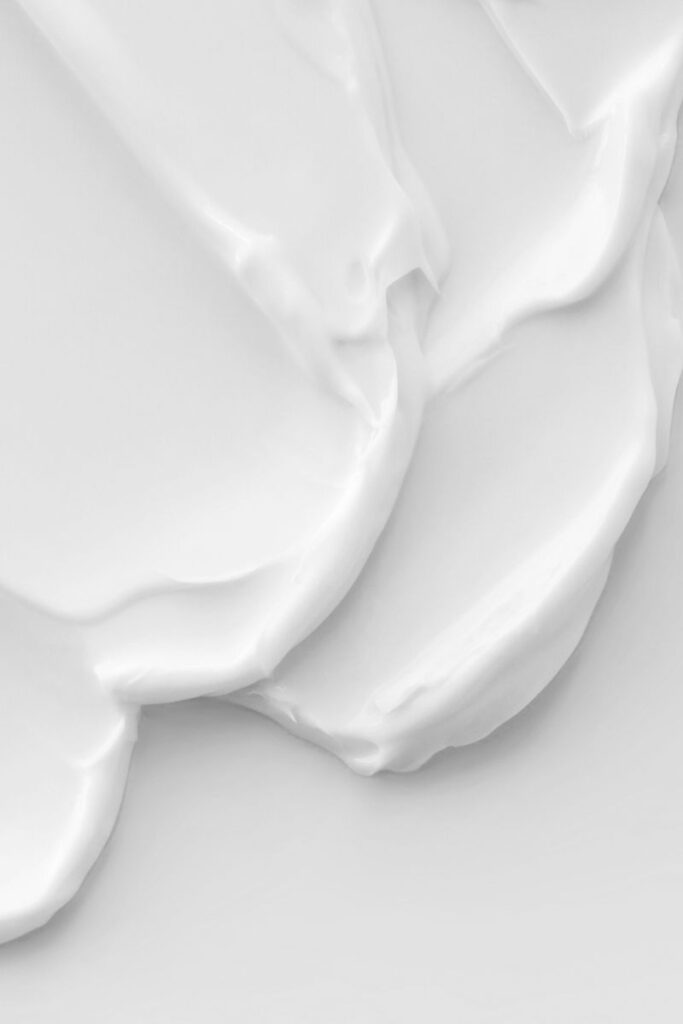
Antiviral Properties of Zinc Oxide
Zinc oxide has been found to exhibit antiviral activity against a wide range of viruses, including the herpes simplex virus responsible for cold sores. When applied topically to the affected area, zinc oxide can help inhibit viral replication, potentially reducing the duration and severity of cold sore outbreaks.
Promoting Faster Healing
In addition to its antiviral properties, zinc oxide supports the skin's healing process. When cold sores blister and rupture, the affected area can become vulnerable to secondary bacterial infections. By applying a thin layer of petroleum jelly containing zinc oxide to the cold sore, you can create a protective barrier that shields the sore from external irritants and bacteria, aiding in the healing process.
Reducing the Spread of the Virus
Cold sores are highly contagious and can be easily spread to other parts of your body or to other people through skin contact or sharing items like utensils, lip balms, or towels. Zinc oxide can help reduce the risk of transmission by minimizing the spread of the virus from an active lesion. However, it's still essential to practice good hygiene, avoid touching the sore, and refrain from engaging in activities like kissing or oral sex during an outbreak.
Using Zinc Oxide for Cold Sore Relief
Zinc oxide is commonly found in over-the-counter cold sore medications and topical creams. When using zinc oxide for cold sores, opt for a product that contains a suitable concentration of the mineral.
Follow the instructions provided on the product label, and apply the cream or ointment directly to the cold sore as soon as it appears. Consistent and early application is key to experiencing its potential benefits.
Important Considerations
Most zinc oxide creams contain mineral oils and more that could further irritate cold sores. I would suggest getting a pure zinc oxide powder to make your own zinc oxide paste.
While zinc oxide is generally safe for topical use, some individuals may experience mild skin irritation or allergic reactions. Before using zinc oxide on a cold sore, it's a good idea to perform a patch test on a small area of skin to check for any adverse reactions. If you experience any irritation, discontinue use and consult a healthcare provider.
Conclusion
Zinc oxide is a valuable addition to the list of herbal remedies for cold sores, thanks to its antiviral properties and ability to promote faster healing. By inhibiting viral replication and creating a protective layer, zinc oxide can help minimize the discomfort associated with cold sore outbreaks and reduce the risk of secondary infections.
Incorporate zinc oxide-based topical products into your cold sore management routine, and remember to practice good hygiene and avoid close contact during an outbreak to further protect yourself and others from the spread of the virus. As with any remedy, consult with a healthcare provider if you have any concerns or questions about using zinc oxide for cold sore relief.
9. Essential Oils - Peppermint Oil and Lemon Juice
Essential oils have gained popularity as natural remedies for various ailments, including cold sores. Peppermint oil and lemon juice are two essential oils with unique properties that can be beneficial in managing cold sore symptoms and promoting faster healing.
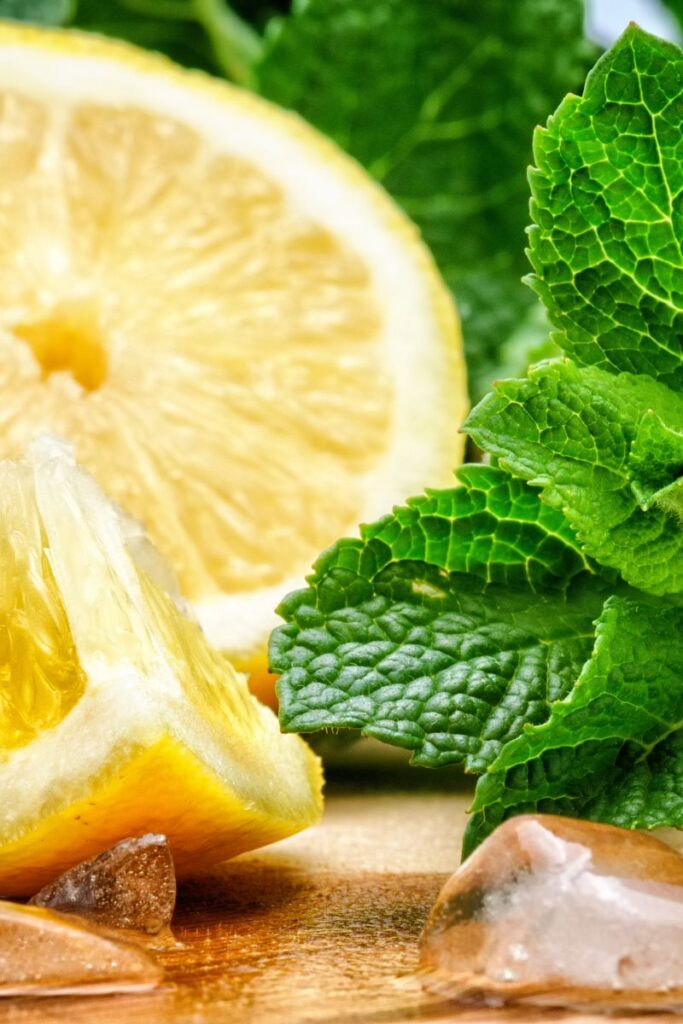
Peppermint Oil
Peppermint oil contains potent antiviral compounds, including menthol, which has been shown to exhibit activity against the herpes simplex virus. When applied topically, peppermint oil can help reduce the replication of the virus and ease the discomfort associated with cold sores.
Try this peppermint pulling oil for extra effectiveness against cold sores - link here.
Calming and Soothing Properties
Apart from its antiviral effects, peppermint oil has a cooling sensation that can provide relief from the pain and inflammation caused by cold sores. Gently apply a diluted solution of peppermint oil to the affected area using a cotton swab to experience its soothing effects.
Cautionary Note
While peppermint oil can be effective, it's crucial to use it properly. Undiluted essential oils can be harsh on the skin and may cause irritation. Always mix peppermint oil with a carrier oil, such as coconut or jojoba oil, before applying it to the cold sore.
Lemon Juice
Lemon juice is a natural source of citric acid and has strong antiviral properties. The acidic nature of lemon juice creates an unfavorable environment for the herpes virus, potentially limiting its replication.
Disinfecting and Drying Out Cold Sores
Applying lemon juice to a cold sore can help disinfect the area and promote faster healing. The drying effect of lemon juice may also help reduce the lifespan of the cold sore and prevent further infection.
Cautionary Note
Although lemon juice can be beneficial, it may cause stinging or irritation when applied directly to a cold sore. To reduce discomfort, dilute the lemon juice with a small amount of water before use.
Using Peppermint Oil and Lemon Juice for Cold Sore Relief
To use peppermint oil or lemon juice for cold sores, follow these steps:
- Dilute the essential oil with a carrier oil (for peppermint oil) or water (for lemon juice).
- Apply the diluted solution to the cold sore using a clean cotton swab.
- Let it sit for a few minutes before rinsing or wiping off gently.
- Repeat this process a few times a day until the cold sore heals.
Important Considerations
Although peppermint oil and lemon juice can be effective natural remedies for cold sores, individual reactions may vary. If you experience any skin irritation or discomfort, discontinue use and consult with a healthcare provider.
Conclusion
Peppermint oil and lemon juice are valuable additions to your arsenal of natural cold sore remedies. Their antiviral properties, along with peppermint oil's cooling and lemon juice's disinfecting effects, can help ease the discomfort of cold sores and promote faster healing.
Always use these essential oils with caution, and make sure to properly dilute them to avoid skin irritation. As with any natural remedy, consistency and proper care are key to experiencing the potential benefits of using peppermint oil and lemon juice for cold sore relief. If you have any concerns or questions about using essential oils for cold sores, consult with a healthcare provider for personalized advice.
10. Ice Pack or Ice Cube
Using an ice pack or ice cube is a simple yet effective home remedy for managing cold sores. Cold temperatures can help reduce inflammation, alleviate pain, and slow down viral replication, making ice a valuable tool in your cold sore treatment arsenal.
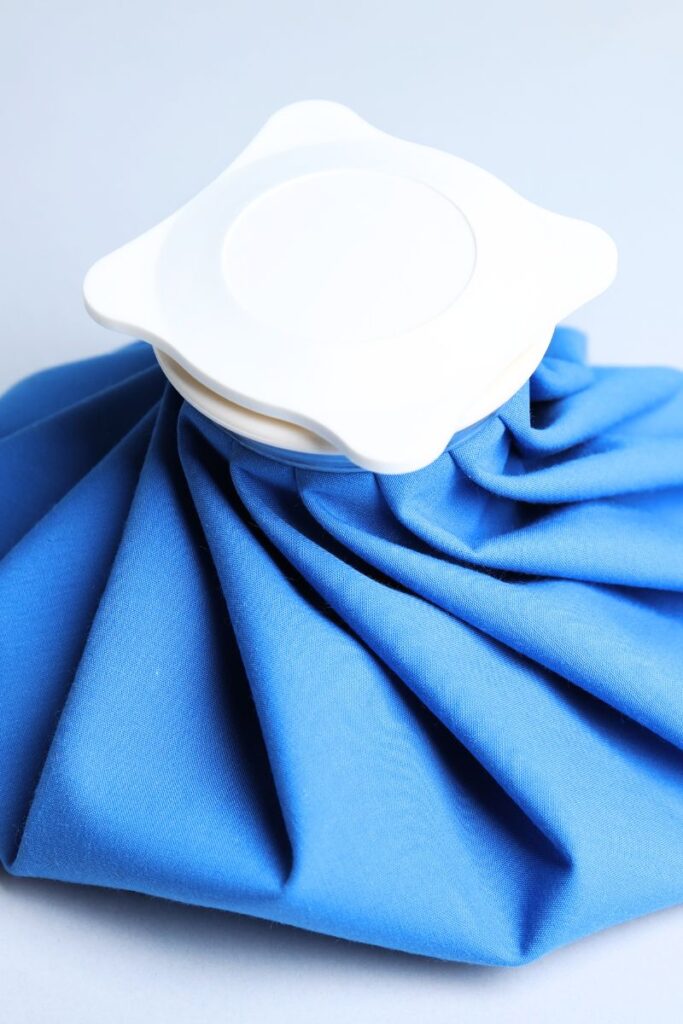
How Ice Helps with Cold Sores
When a cold sore appears, it often causes redness, swelling, and discomfort. Applying an ice pack or ice cube directly to the affected area can provide immediate relief by numbing the nerve endings and reducing inflammation. The cold temperature constricts blood vessels, which may help limit the spread of the virus and decrease the size of the blister.
Reducing Pain and Discomfort
Cold sores can be painful and uncomfortable, especially during the blistering stage. Applying ice can help temporarily numb the area, providing a natural analgesic effect. This can be particularly beneficial during the early stages of a cold sore outbreak when the sore is most painful.
Slowing Down the Replication of the Virus
The herpes simplex virus thrives in a warm environment, and cold sores tend to develop and spread more rapidly in such conditions. By applying an ice pack or ice cube to the affected area, you create an environment that is less favorable for viral replication, potentially slowing down the progression of the cold sore.
Using Ice for Cold Sore Relief
Using an ice pack or ice cube for cold sore relief is simple and convenient:
- Wrap an ice pack or ice cube in a thin cloth to avoid direct skin contact, as extreme cold can damage the skin.
- Gently press the ice pack or ice cube against the cold sore for about 10-15 minutes.
- Take breaks if the cold becomes uncomfortable, and wait for a few minutes before reapplying.
- Repeat this process several times a day, especially during the early stages of a cold sore outbreak.
Cautionary Note
While ice can provide relief and slow down viral replication, it does not have antiviral properties to eliminate the herpes virus. It is a complementary measure that can help manage cold sore symptoms but is not a cure.
Conclusion
An ice pack or ice cube is a straightforward and natural remedy that can help ease the discomfort and inflammation associated with cold sores. By reducing pain and slowing down viral replication, ice can be an effective tool in managing cold sore outbreaks.
Remember to use a thin cloth or towel to protect your skin from extreme cold, and avoid direct contact with the ice. While ice can provide temporary relief, it is essential to address the root cause of cold sores, which is the herpes simplex virus. As with any home remedy, consistency and proper care are essential for experiencing the potential benefits of using ice for cold sore relief.
The Best Herbal Remedy For Cold Sore
With this comprehensive guide to the best herbal remedy for cold sores, I want you to keep in mind that the best remedy is the one that is most effective for you.
Each person is unique, and each herbal remedy is unique to how your body responds to it. If you want to learn more about making and using home herbal remedies, check out my "Guide To Herbal Remedies" here!
